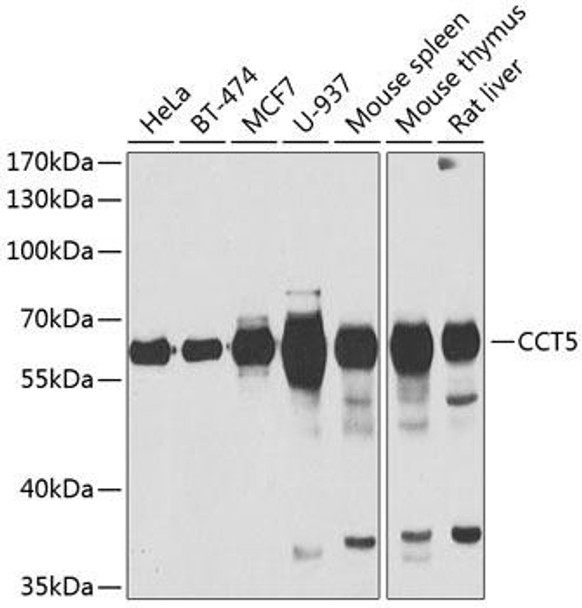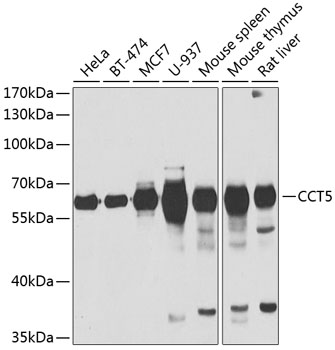Anti-CCT5 Antibody (CAB6549)
- SKU:
- CAB6549
- Product type:
- Antibody
- Reactivity:
- Human
- Mouse
- Rat
- Host Species:
- Rabbit
- Isotype:
- IgG
- Antibody Type:
- Polyclonal Antibody
- Research Area:
- Cell Biology
Frequently bought together:
Description
| Antibody Name: | Anti-CCT5 Antibody |
| Antibody SKU: | CAB6549 |
| Antibody Size: | 20uL, 50uL, 100uL |
| Application: | WB |
| Reactivity: | Human, Mouse, Rat |
| Host Species: | Rabbit |
| Immunogen: | Recombinant fusion protein containing a sequence corresponding to amino acids 1-270 of human CCT5 (NP_036205.1). |
| Application: | WB |
| Recommended Dilution: | WB 1:500 - 1:2000 |
| Reactivity: | Human, Mouse, Rat |
| Positive Samples: | HeLa, BT-474, MCF7, U-937, Mouse spleen, Mouse thymus, Rat liver |
| Immunogen: | Recombinant fusion protein containing a sequence corresponding to amino acids 1-270 of human CCT5 (NP_036205.1). |
| Purification Method: | Affinity purification |
| Storage Buffer: | Store at -20°C. Avoid freeze / thaw cycles. Buffer: PBS with 0.02% sodium azide, 50% glycerol, pH7.3. |
| Isotype: | IgG |
| Sequence: | MASM GTLA FDEY GRPF LIIK DQDR KSRL MGLE ALKS HIMA AKAV ANTM RTSL GPNG LDKM MVDK DGDV TVTN DGAT ILSM MDVD HQIA KLMV ELSK SQDD EIGD GTTG VVVL AGAL LEEA EQLL DRGI HPIR IADG YEQA ARVA IEHL DKIS DSVL VDIK DTEP LIQT AKTT LGSK VVNS CHRQ MAEI AVNA VLTV ADME RRDV DFEL IKVE GKVG GRLE DTKL IKGV IVDK DFSH PQMP KKVE DAKI AILT CPFE PPKP KTKH KLDV TS |
| Gene ID: | 22948 |
| Uniprot: | P48643 |
| Cellular Location: | Cytoplasm, centrosome, cytoskeleton, microtubule organizing center |
| Calculated MW: | 49kDa/59kDa |
| Observed MW: | 60kDa |
| Synonyms: | CCT5, CCT-epsilon, CCTE, HEL-S-69, PNAS-102, TCP-1-epsilon |
| Background: | The protein encoded by this gene is a molecular chaperone that is a member of the chaperonin containing TCP1 complex (CCT), also known as the TCP1 ring complex (TRiC). This complex consists of two identical stacked rings, each containing eight different proteins. Unfolded polypeptides enter the central cavity of the complex and are folded in an ATP-dependent manner. The complex folds various proteins, including actin and tubulin. Mutations in this gene cause hereditary sensory and autonomic neuropathy with spastic paraplegia (HSNSP). Alternative splicing results in multiple transcript variants. Related pseudogenes have been identified on chromosomes 5 and 13. |
| UniProt Protein Function: | CCT-epsilon: Molecular chaperone; assists the folding of proteins upon ATP hydrolysis. As part of the BBS/CCT complex may play a role in the assembly of BBSome, a complex involved in ciliogenesis regulating transports vesicles to the cilia. Known to play a role, in vitro, in the folding of actin and tubulin. Defects in CCT5 are the cause of hereditary sensory neuropathy autosomal recessive with spastic paraplegia (HSNSP). The disease is characterized by spastic paraplegia and progressive distal sensory neuropathy leading to mutilating ulcerations of the upper and lower limbs. Belongs to the TCP-1 chaperonin family. |
| UniProt Protein Details: | Protein type:Chaperone Chromosomal Location of Human Ortholog: 5p15.2 Cellular Component: chaperonin-containing T-complex; centrosome; microtubule; cytoplasm; nucleolus; cytosol Molecular Function:protein binding; unfolded protein binding; beta-tubulin binding; G-protein beta-subunit binding; ATP binding Biological Process: 'de novo' posttranslational protein folding; cellular protein metabolic process; protein folding; binding of sperm to zona pellucida; response to virus Disease: Neuropathy, Hereditary Sensory, With Spastic Paraplegia, Autosomal Recessive |
| NCBI Summary: | The protein encoded by this gene is a molecular chaperone that is a member of the chaperonin containing TCP1 complex (CCT), also known as the TCP1 ring complex (TRiC). This complex consists of two identical stacked rings, each containing eight different proteins. Unfolded polypeptides enter the central cavity of the complex and are folded in an ATP-dependent manner. The complex folds various proteins, including actin and tubulin. Alternate transcriptional splice variants of this gene have been observed but have not been thoroughly characterized. In addition, three pseudogenes of this gene have been identified. [provided by RefSeq, Jun 2010] |
| UniProt Code: | P48643 |
| NCBI GenInfo Identifier: | 1351211 |
| NCBI Gene ID: | 22948 |
| NCBI Accession: | P48643.1 |
| UniProt Secondary Accession: | P48643,A8JZY8, A8K2X8, B4DYD8, |
| UniProt Related Accession: | P48643 |
| Molecular Weight: | 541 |
| NCBI Full Name: | T-complex protein 1 subunit epsilon |
| NCBI Synonym Full Names: | chaperonin containing TCP1, subunit 5 (epsilon) |
| NCBI Official Symbol: | CCT5 |
| NCBI Official Synonym Symbols: | CCTE; HEL-S-69; CCT-epsilon; TCP-1-epsilon |
| NCBI Protein Information: | T-complex protein 1 subunit epsilon; epididymis secretory protein Li 69; T-complex protein 1, epsilon subunit |
| UniProt Protein Name: | T-complex protein 1 subunit epsilon |
| UniProt Synonym Protein Names: | CCT-epsilon |
| Protein Family: | T-complex protein |
| UniProt Gene Name: | CCT5 |
| UniProt Entry Name: | TCPE_HUMAN |





